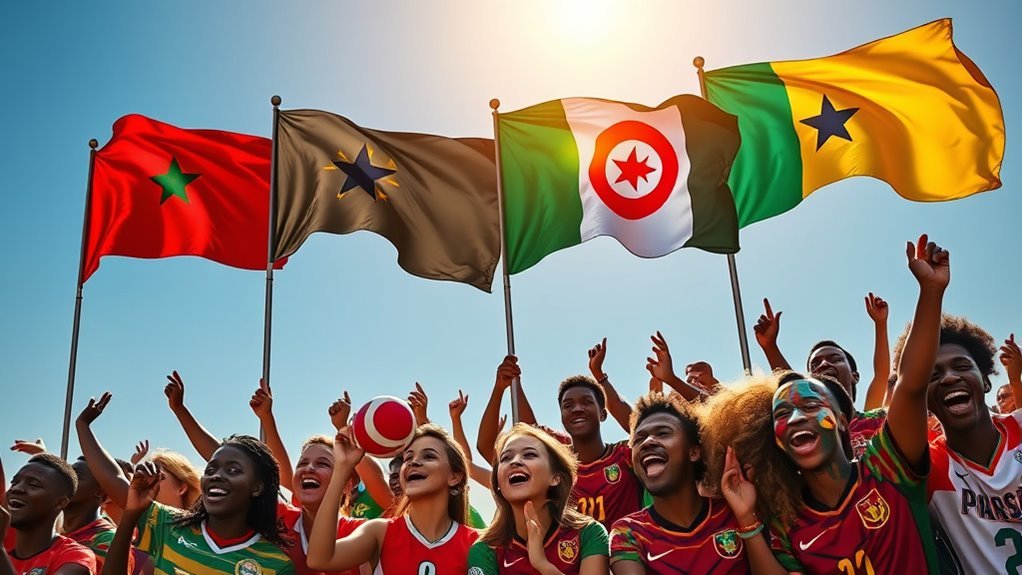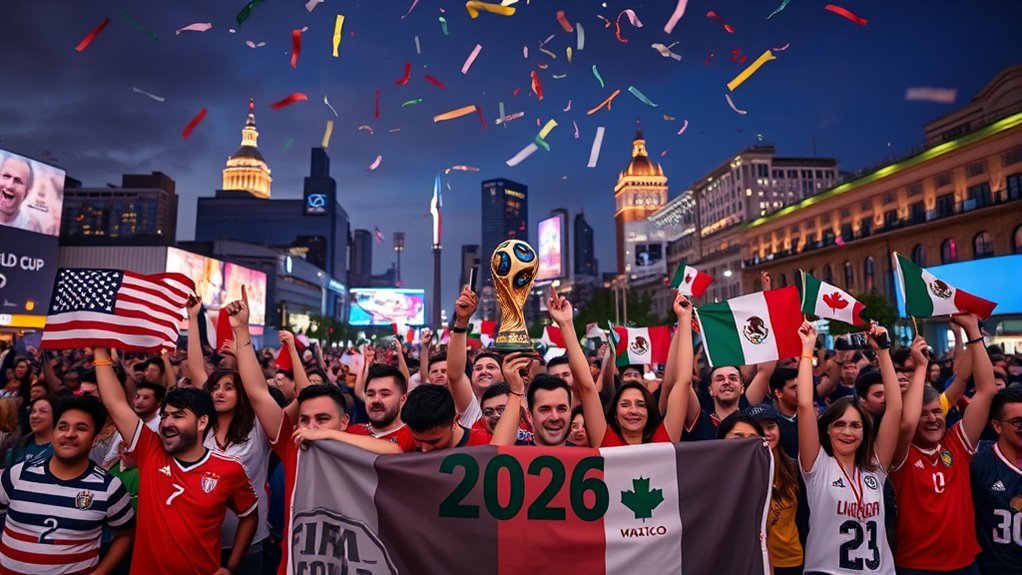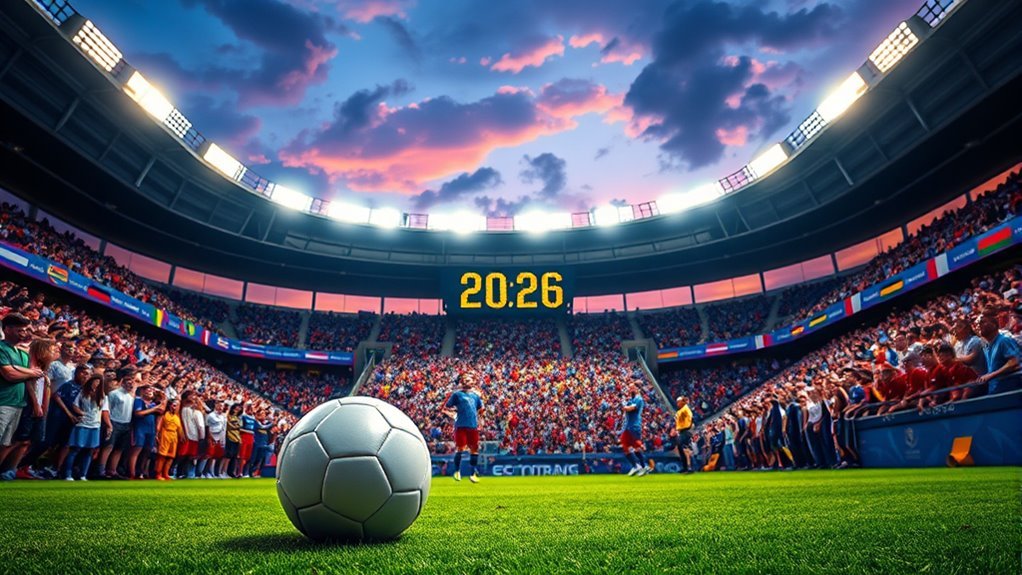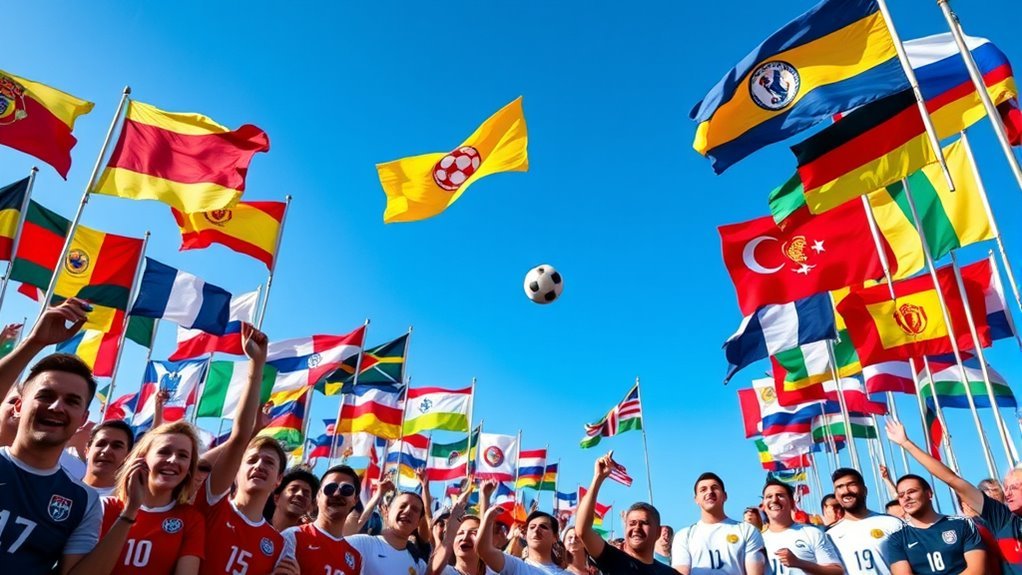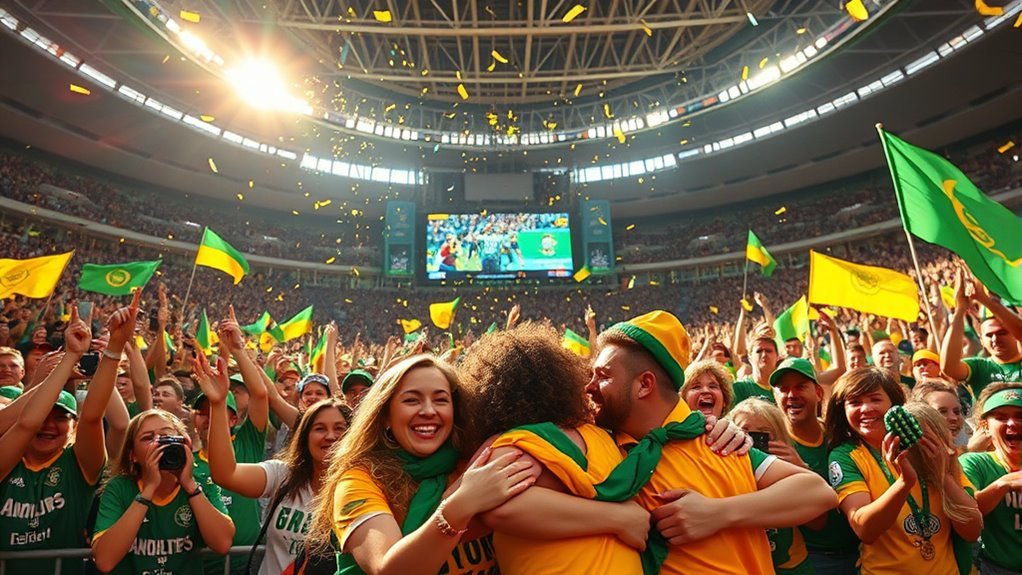Five African nations have qualified for the FIFA World Cup 2026, proving their resilience and talent on the global stage. Each team brings a unique blend of experience and youthful energy, aiming to make their mark in the tournament. Fans across Africa rally behind their players, igniting community pride and excitement. As you explore further, you’ll discover the historical performances of these teams and the challenges they face in the quest for greatness.
Overview of African Participation in FIFA World Cup
Since the first FIFA World Cup in 1930, African nations have gradually made their mark on the global stage. You might not realize how far African soccer has come, with teams showcasing their skills and passion in the world’s most prestigious tournament. Each World Cup has added to the rich tapestry of World Cup history, as African players have brought their unique flair and determination to the pitch.
From the early days when participation was limited to a few teams, to the present where multiple nations compete, the growth is undeniable. You can see the impact of African soccer in the excitement it brings to fans and its role in uniting communities back home. As nations continue to push boundaries and aim for excellence, the future of African representation in the World Cup looks bright. The journey isn’t just about soccer; it’s about freedom, pride, and the relentless pursuit of greatness.
Countries That Have Qualified So Far
As we look at the countries that have qualified for the FIFA World Cup 2026, you’ll notice some familiar names alongside potential newcomers. It’s fascinating to see how these nations have performed historically and how that might influence their chances this time around. Let’s explore who’s in and what trends we can expect.
Current Qualified Nations
So far, five African nations have secured their spots for the FIFA World Cup 2026. These current qualified nations are showcasing the continent’s potential on the global stage. As you look at these teams, it’s clear they’ve put in the hard work, demonstrating resilience and talent. A strategic analysis of their recent performances reveals strengths that could surprise many as they compete against the world’s best. Each country’s journey to qualification reflects a commitment to excellence and the spirit of freedom that sports embody. Fans across Africa are rallying behind their teams, enthusiastic for the chance to support them in this prestigious tournament. The excitement is palpable, and the stage is set for an unforgettable World Cup experience!
Historical Performance Trends
While the spotlight is on the five African nations qualified for the FIFA World Cup 2026, examining their historical performance trends reveals intriguing patterns. You’ll notice that these nations have evolved regarding performance metrics and team strategies over the years. Here are three key trends:
- Improved Match Outcomes: Many African teams have consistently progressed past the group stages in recent tournaments.
- Emerging Talents: A focus on developing homegrown talent has led to stronger squads and innovative play styles.
- Coaching Evolution: The hiring of experienced coaches has transformed team strategies, making them more competitive on the world stage.
These trends showcase a promising future for African football, as these nations aim for greater heights in international tournaments.
Historical Performance of African Teams in World Cups
When you look at the FIFA World Cup history, African teams have made some notable strides. From their initial appearances to their best performances, there’s a lot to unpack about how these nations have evolved on the global stage. It’s fascinating to see how far they’ve come and what they might achieve in future tournaments.
Previous World Cup Appearances
Over the years, African teams have made notable strides in the FIFA World Cup, with five nations representing the continent in previous tournaments. Understanding this historical context reveals their growth and determination. Here are some memorable matches that stand out:
- Cameroon’s 1990 run: They reached the quarter-finals, showcasing their grit against England.
- Senegal’s debut in 2002: They stunned France, the defending champions, in an electrifying opening match.
- Ghana in 2010: Their thrilling journey to the quarter-finals kept fans on the edge of their seats, narrowly missing a semi-final spot.
These moments not only highlight African teams’ talent but also inspire future generations to chase their World Cup dreams with fervor and resilience.
Best Performances Recorded
African teams have made significant strides in the FIFA World Cup, with three nations reaching the quarter-finals, marking their best performances on the world stage. Let’s take a look at these memorable matches that showcased the talent and determination of African players.
| Country | Year | Best Performance |
|---|---|---|
| Cameroon | 1990 | Quarter-finals |
| Senegal | 2002 | Quarter-finals |
| Ghana | 2010 | Quarter-finals |
These moments not only thrilled fans but also ignited a sense of pride across the continent. Each match was a demonstration of the resilience and skill of African teams, proving that they can compete at the highest level. As you reflect on these performances, you can’t help but feel excited for the future of African football.
The Qualification Process for African Nations
As the excitement builds for the FIFA World Cup 2026, understanding the qualification process for African nations becomes essential. The journey to the World Cup isn’t just about talent; it involves maneuvering specific qualification criteria set by FIFA and CAF (Confederation of African Football). Here’s a quick breakdown of how it works:
As the FIFA World Cup 2026 approaches, understanding the African qualification process is crucial for fans and teams alike.
- Regional Tournaments: Teams compete in CAF’s Africa Cup of Nations qualifiers and other regional tournaments to showcase their skills.
- Group Stages: Nations are divided into groups, where they play home and away matches to earn points.
- Final Playoffs: The top teams advance to a playoff round for a chance to secure their place in the World Cup.
This process allows African nations to prove themselves on a global stage, embracing the spirit of competition and freedom that football embodies.
Notable Players to Watch From Qualified Countries
With several nations securing their spots in the FIFA World Cup 2026, fans are keen to see the standout players who’ll represent their countries on the world stage. Among the notable players, keep an eye on the likes of Mohamed Salah from Egypt and Sadio Mané from Senegal. They bring experience and flair, often leading their teams with poise and skill.
However, it’s also exciting to discover emerging talents like Kamaldeen Sulemana from Ghana and Achraf Hakimi from Morocco, who can light up the tournament with their youthful energy and creativity.
Here’s a quick look at some players to watch:
| Country | Notable Players | Emerging Talents |
|---|---|---|
| Egypt | Mohamed Salah | |
| Senegal | Sadio Mané | |
| Morocco | Achraf Hakimi | Kamaldeen Sulemana |
These athletes will certainly make waves in the competition!
Challenges Faced by African Teams
Despite their growing talent and passion for the game, African teams often face significant challenges on the road to success in the FIFA World Cup. You’ll notice that several issues hinder their progress, including:
African teams showcase immense talent, yet they encounter numerous obstacles on their journey to World Cup success.
- Resource Limitations: Many teams struggle with financial constraints that impact everything from player salaries to travel expenses.
- Infrastructure Challenges: Poor facilities and inadequate training environments limit talent development and coaching quality, making it tough for players to reach their full potential.
- Political Instability: This can lead to disruptions in youth programs and player retention, as many athletes seek opportunities elsewhere.
Moreover, the intense competition from other nations adds pressure. While fan support is passionate, it doesn’t always translate into the necessary backing for development programs. African teams need to address these hurdles to harness their talent and compete effectively on the global stage.
The Impact of Hosting on African Teams’ Performance
Hosting a major tournament like the FIFA World Cup can greatly influence African teams’ performance, often providing them with a unique advantage. When teams play on their home soil, they enjoy a significant home advantage. Familiarity with the pitch and local climate can boost their confidence and effectiveness on the field.
Local support is another essential factor. Fans rally behind their teams, creating an electrifying atmosphere that can uplift players’ spirits. This passionate backing can turn the tide during critical moments in matches, making every goal feel more impactful.
In addition, the pride of representing their nation in front of home crowds can inspire players to perform beyond their usual capabilities. So, when it comes to hosting, the combination of home advantage and local support can be a game-changer for African teams, giving them an edge that might just lead to unforgettable victories.
Future Prospects for African Soccer
As African soccer continues to evolve, the future looks promising for the continent’s teams and players. To harness this potential, several key areas need focus:
- Youth Development and Grassroots Initiatives: Investing in young talent guarantees a sustainable pipeline for future stars.
- Coaching Education and Talent Scouting: Enhancing coaching standards will improve player performance, while effective scouting identifies hidden gems.
- Infrastructure Improvements and League Competitiveness: Upgrading facilities and fostering competitive leagues will attract sponsorship opportunities and boost media exposure.
Fan Engagement and Support for Qualified Nations
The success of African nations in qualifying for the FIFA World Cup 2026 brings a wave of excitement that can greatly enhance fan engagement. As a supporter, you’ll find yourself more connected than ever to your nation’s journey. This is the perfect opportunity to rally around your team, whether through social media, local gatherings, or viewing parties.
Supporter initiatives will play an essential role in fostering this connection. Fans can create vibrant communities, sharing experiences and celebrating victories together. Engaging with your team’s story and culture can deepen your passion and commitment. Incorporating mindfulness techniques can also enhance your experience, allowing you to fully immerse yourself in the joy of supporting your team.
Don’t just be a spectator—get involved! Join local fan clubs, participate in discussions, and attend events that celebrate your nation’s success. Your enthusiasm can inspire others and create a powerful atmosphere of unity and pride. Together, let’s elevate fan engagement and support our teams as they pursue glory on the world stage!
Frequently Asked Questions
How Many Teams Will Africa Send to the 2026 World Cup?
Africa’s set to send nine teams to the 2026 World Cup, reflecting stronger African representation. With new qualification criteria, you’ll see more nations vying for a chance to showcase their talent on the world stage.
When Will the World Cup Matches Take Place in 2026?
In the grand tapestry of sports, the World Cup matches will unfold from June 8 to July 8, 2026. Mark those match dates; they’re your chance to witness dreams igniting and freedom celebrated on the field.
Which Cities in Africa Are Potential World Cup Host Cities?
You’ll find potential host cities in Africa like Johannesburg, Cape Town, and Durban. These city selections reflect vibrant cultures and passionate fans, creating an unforgettable atmosphere for the World Cup, showcasing freedom through sport.
What Are the Ticketing Procedures for the 2026 World Cup?
You’ll purchase tickets through the official FIFA website, ensuring a seamless experience. Keep an eye out for fan experiences, as they’ll enhance your World Cup journey, allowing you to embrace the excitement freely!
How Can Fans Support Their Teams During the Qualification Process?
To support your teams during qualification, engage with fellow fans on social media, attend local watch parties, and celebrate victories. Did you know that passionate fan engagement can boost team spirit and influence performance?
